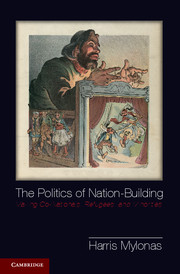Book contents
- Frontmatter
- Contents
- List of Figures, Maps, Tables, Graph, and Illustrations
- Acknowledgments
- List of Abbreviations
- Preface
- 1 Introduction
- Part I Theory
- Part II Empirical Evidence
- 3 Why the Balkans?
- 4 Cross-National Variation
- 5 Odd Cases
- 6 Subnational Variation
- 7 Temporal Variation
- 8 Application of the Theory Beyond the Balkans
- 9 Conclusion
- Methodological Appendix
- References
- Author Index
- Historical Name Index
- Subject Index
- References
9 - Conclusion
Published online by Cambridge University Press: 05 January 2013
- Frontmatter
- Contents
- List of Figures, Maps, Tables, Graph, and Illustrations
- Acknowledgments
- List of Abbreviations
- Preface
- 1 Introduction
- Part I Theory
- Part II Empirical Evidence
- 3 Why the Balkans?
- 4 Cross-National Variation
- 5 Odd Cases
- 6 Subnational Variation
- 7 Temporal Variation
- 8 Application of the Theory Beyond the Balkans
- 9 Conclusion
- Methodological Appendix
- References
- Author Index
- Historical Name Index
- Subject Index
- References
Summary
I introduced my argument referring to the shift of Ottoman policies toward the Armenians at the turn of the nineteenth century. Within a couple of decades, Ottoman perceptions of Armenians changed dramatically from viewing them as the most loyal millet to perceiving them as a threat to the country’s territorial integrity. Policies of accommodation that lasted for centuries were followed by mass killings and deportations. What accounts for this puzzling shift of Ottoman perceptions and policies toward Armenians? Why, how, and when does one become a co-ethnic, a minority, or a refugee?
The most prominent explanations for the variation in nation-building policies focus on domestic factors. Often the ethnic politics that result from the salience of different attributes between the core and the non-core group (race, religion, language) are considered the cause of such policy choices. Other scholars suggest that what matters are political ideologies of the ruling elites or the regime type of the host state where the non-core group resides. For others the history of past interactions between the core and the non-core groups or demographic and terrain variables can explain state policies toward non-core groups. All these explanations capture important aspects of the dynamics of nation-building. But they cannot account for the variation in nation-building policies across space and over time without taking into account the international security environment. The dynamic that I have highlighted in both my theory and empirical chapters has gone largely unnoticed.
- Type
- Chapter
- Information
- The Politics of Nation-BuildingMaking Co-Nationals, Refugees, and Minorities, pp. 187 - 200Publisher: Cambridge University PressPrint publication year: 2013



